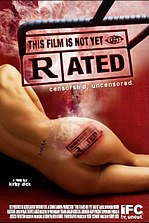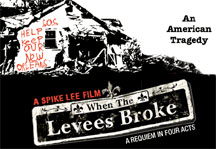
Knight at the Movies ARCHIVES
Two illuminating documentaries that don't mince words -- or images
“No film can survive the brazen hiss of public scorn” Jack Valenti, master lobbyist and head of the Motion Picture Association of
America (MPAA) said when he announced the film rating system in 1968. Throughout Valenti’s tenure (which ended in 2004), the
rating system went through several mutations (“X” became “NC-17,” for example) but since its institution four things have remained
a constant (to apparently avoid any further outbreak of brazen hissing): 1) all films are rated confidentially by a panel of secret
raters, 2) films with violence versus those with sex have gotten less prohibitive ratings, 3) independent releases have often been
subjected to tougher ratings than major studio releases and 4) films with GLBT themed content have ALWAYS been given harsher
ratings than their straight counterparts.
After a decade of watching this happen, filmmaker Kirby Dick had had enough. This Films Is Not Yet Rated, the documentary
result of his rage at the MPAA’s blatant censorship, is at once an eye opening indictment of the unfair system and a humorous
attempt to unmask the identities of the association’s secret raters. The movie is like an extended episode of Michael Moore’s
television show, “TV Nation” without Moore’s excessive need to hit the audience over the head with his point.
The movie does that right out of the gate with Kimberly Peirce, director of the gender bending Boys Don’t Cry who simply lays out the
trouble the movie had in avoiding the dreaded NC-17 rating (dreaded because media outlets refuse advertisements for films with
the rating and an NC-17 has a demonstrated, negative effect on box office returns). Peirce goes on to talk about the apparent
skittishness the board had with the movie’s scenes of woman on woman pleasure between Hilary Swank and Chloë Sevigny while
scenes of rape and murder didn’t seem to be a problem. The point is echoed later by gay directors Jamie Babbit and John Waters.
Both experienced rating difficulties with their sexually tinged films, But I’m A Cheerleader and A Dirty Shame. At one point Dick gives
us side by side comparisons between GLBT and straight films. American Pie and its ilk have gotten preferential treatment while
Mysterious Skin and other GLBT movies have suffered.
As we are seeing these comparisons and listening to repeated examples of unfair ratings and the even crazier appeals process of
independent movies by a bevy of directors (and the lone, brave actor to appear on camera, Maria Bello), Dick integrates a history of
the MPAA, lays out the organization’s powerful ties to legislators, provides testimony from two former film raters about the arbitrary
fashion of the system, and, finally, in an entertaining twist, has the inspiration to hire a private investigator to help him ferret out
the secret identities of the MPAA’s film raters. He settles on Becky Altringer, who brings a lot of enthusiasm and skill to her
assignment. We then spend time with Becky and her partner (their lesbianism is mentioned in passing) and Becky’s niece on
stakeouts outside of MPAA headquarters in Los Angeles. Though Becky is ultimately successful in tracking down the identities of the
ratings board it’s a small comfort – the board often changes raters and they have yet, apparently, to include a single openly gay or
lesbian member. But it also doesn’t include any experts in psychology, sociology or any other kind of “ology” – though “normal”
folks with kids are desired for the job. Based on the evidence in Dick’s exasperating though entertaining film, it looks like Our
People are not the only ones taking it up the butt, Bob. Naturally, This Film Is Not Yet Rated is Rated NC-17.
+++++++++++++++++++++++++++++++++++++++++++++++++++++++++++++++++++++++++++++++++++++++++++++
Spike Lee has also made a documentary that leaves you exasperated – though When the Levees Broke has none of the
lighthearted brevity to help lesson the sting. Lee’s 4 ½ hour opus is one of those not to be missed experiences – like the 9/11
television documentaries, The Corporation, Ken Burns’ The Civil War, and all those “American Experience” presidential biographies.
Like those, the pace of Lee’s film belies its length – it’s riveting and lyrical and stuffed with unforgettable images and memorable
participants. It doesn’t seem one second too long.
In an odd way, the movie reflects the languid feel of the cumulative effect that Hurricane Katrina and its aftermath have had on New
Orleans. It’s all here – including the rage, bitterness and frustration – but it happens before our eyes slowly and methodically –
every wrong decision, every example of disinterest over the disenfranchised by public officials. All Lee has to do is show the news
footage of the politicians playing the blame game in the aftermath and adding their tsk tsk sound bites to the outraged media
coverage (which has virtually disappeared). The facts speak for themselves and were widely documented. To these familiar targets
and scenes (which come right on cue) Lee adds the personal testimony of the survivors and the even more heartbreaking sadness of
seeing many of them trying to return to their ravaged homes.
Throughout, Lee’s longtime musical collaborator, jazz trumpeter and film composer, Terence Blanchard (himself an on camera
participant as a native of New Orleans) underscores the film with Aaron Copland inspired elegies that are at once beautiful and sad.
Blanchard has written many incredibly rich, somber scores for Lee’s movies (with the one for Clockers topping the list) but he has
outdone himself here.
When the Levees Broke plays all month on HBO.
America (MPAA) said when he announced the film rating system in 1968. Throughout Valenti’s tenure (which ended in 2004), the
rating system went through several mutations (“X” became “NC-17,” for example) but since its institution four things have remained
a constant (to apparently avoid any further outbreak of brazen hissing): 1) all films are rated confidentially by a panel of secret
raters, 2) films with violence versus those with sex have gotten less prohibitive ratings, 3) independent releases have often been
subjected to tougher ratings than major studio releases and 4) films with GLBT themed content have ALWAYS been given harsher
ratings than their straight counterparts.
After a decade of watching this happen, filmmaker Kirby Dick had had enough. This Films Is Not Yet Rated, the documentary
result of his rage at the MPAA’s blatant censorship, is at once an eye opening indictment of the unfair system and a humorous
attempt to unmask the identities of the association’s secret raters. The movie is like an extended episode of Michael Moore’s
television show, “TV Nation” without Moore’s excessive need to hit the audience over the head with his point.
The movie does that right out of the gate with Kimberly Peirce, director of the gender bending Boys Don’t Cry who simply lays out the
trouble the movie had in avoiding the dreaded NC-17 rating (dreaded because media outlets refuse advertisements for films with
the rating and an NC-17 has a demonstrated, negative effect on box office returns). Peirce goes on to talk about the apparent
skittishness the board had with the movie’s scenes of woman on woman pleasure between Hilary Swank and Chloë Sevigny while
scenes of rape and murder didn’t seem to be a problem. The point is echoed later by gay directors Jamie Babbit and John Waters.
Both experienced rating difficulties with their sexually tinged films, But I’m A Cheerleader and A Dirty Shame. At one point Dick gives
us side by side comparisons between GLBT and straight films. American Pie and its ilk have gotten preferential treatment while
Mysterious Skin and other GLBT movies have suffered.
As we are seeing these comparisons and listening to repeated examples of unfair ratings and the even crazier appeals process of
independent movies by a bevy of directors (and the lone, brave actor to appear on camera, Maria Bello), Dick integrates a history of
the MPAA, lays out the organization’s powerful ties to legislators, provides testimony from two former film raters about the arbitrary
fashion of the system, and, finally, in an entertaining twist, has the inspiration to hire a private investigator to help him ferret out
the secret identities of the MPAA’s film raters. He settles on Becky Altringer, who brings a lot of enthusiasm and skill to her
assignment. We then spend time with Becky and her partner (their lesbianism is mentioned in passing) and Becky’s niece on
stakeouts outside of MPAA headquarters in Los Angeles. Though Becky is ultimately successful in tracking down the identities of the
ratings board it’s a small comfort – the board often changes raters and they have yet, apparently, to include a single openly gay or
lesbian member. But it also doesn’t include any experts in psychology, sociology or any other kind of “ology” – though “normal”
folks with kids are desired for the job. Based on the evidence in Dick’s exasperating though entertaining film, it looks like Our
People are not the only ones taking it up the butt, Bob. Naturally, This Film Is Not Yet Rated is Rated NC-17.
+++++++++++++++++++++++++++++++++++++++++++++++++++++++++++++++++++++++++++++++++++++++++++++
Spike Lee has also made a documentary that leaves you exasperated – though When the Levees Broke has none of the
lighthearted brevity to help lesson the sting. Lee’s 4 ½ hour opus is one of those not to be missed experiences – like the 9/11
television documentaries, The Corporation, Ken Burns’ The Civil War, and all those “American Experience” presidential biographies.
Like those, the pace of Lee’s film belies its length – it’s riveting and lyrical and stuffed with unforgettable images and memorable
participants. It doesn’t seem one second too long.
In an odd way, the movie reflects the languid feel of the cumulative effect that Hurricane Katrina and its aftermath have had on New
Orleans. It’s all here – including the rage, bitterness and frustration – but it happens before our eyes slowly and methodically –
every wrong decision, every example of disinterest over the disenfranchised by public officials. All Lee has to do is show the news
footage of the politicians playing the blame game in the aftermath and adding their tsk tsk sound bites to the outraged media
coverage (which has virtually disappeared). The facts speak for themselves and were widely documented. To these familiar targets
and scenes (which come right on cue) Lee adds the personal testimony of the survivors and the even more heartbreaking sadness of
seeing many of them trying to return to their ravaged homes.
Throughout, Lee’s longtime musical collaborator, jazz trumpeter and film composer, Terence Blanchard (himself an on camera
participant as a native of New Orleans) underscores the film with Aaron Copland inspired elegies that are at once beautiful and sad.
Blanchard has written many incredibly rich, somber scores for Lee’s movies (with the one for Clockers topping the list) but he has
outdone himself here.
When the Levees Broke plays all month on HBO.
Eye Openers:
This Film Is Not Yet Rated-When the Levees Broke
9-13-06 Knight at the Movies Column
By Richard Knight, Jr.
This Film Is Not Yet Rated-When the Levees Broke
9-13-06 Knight at the Movies Column
By Richard Knight, Jr.


